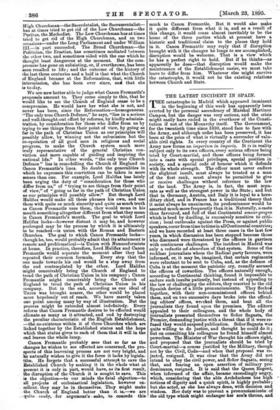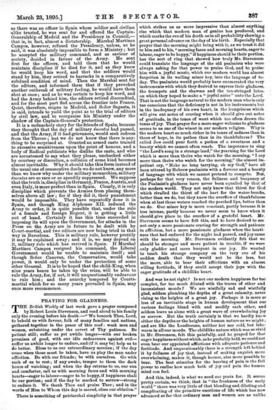THE LATEST INCIDENT IN SPAIN. T HE catastrophe in Madrid which
appeared imminent in the beginning of this week has apparently been averted by the personal ascendency of Marshal Martinez Campos, but the danger was very serious, and the crisis might easily have ended in the overthrow of the Consti- tution if not of the Monarchy itself. The Government, for the twentieth time since 1830, stood face to face with the Army, and although order has been preserved, it has been at the price of what is virtually a surrender of valu- able civil rights. In every country of the Continent the Army now forms an imperium in imperio. It is in reality subject only to its own officers, every serious offence being tried by Court-martial, and those officers being formed into a caste with special privileges, special position in society, and a special code of honour which it defends with its whole strength. The officer must never endure the slightest insult, must always be treated as a man of the first rank, must always be permitted to give or receive challenges without reference to the law of the land. The Army is, in fact, the most sepa- rate as well as the strongest power in the State ; and but that in Germany, Austria, and Italy it is loyal to a here- ditary chief, and in France has a traditional theory that it must always be unanimous, its predominance would be asserted much more frequently than it is. Naturally, a caste thus favoured, and full of that Continental amour-propre which is bred by duelling, is excessively sensitive to criti- cism; local outbreaks against the Press, or against public speakers, occur from time to time in allContinental countries; and we have recorded at least three cases in the last few years, in which discussion has been stopped because those who discussed were threatened by the officers in garrison with continuous challenges. The incident in Madrid was only a reductio ad absurd am of that system. Some of the reckless journalists whom the Radical party favours, were informed, or, it may be, imagined, that certain regiments were reluctant to be sent to Cuba, and, as the defence of Cuba is at the moment the patriotic cry, roundly accused the officers of cowardice. The officers naturally enough, according to Continental thinking, found it impossible to endure such insults patiently, but instead of appealing to the law or challenging the editors, they resorted to the old Spanish device of a little pronunciamiento. They flocked together, with their non-commissioned officers behind them, and on two successive days broke into the offend- ing editors' offices, wrecked them, and beat all the journalists they found upon the premises. The editors appealed to their colleagues, and the whole body of journalists presented themselves to Sefior Sagasta, the Premier, demanding justice with a threat that if it were re- fused they would suspend publication. Seilor Sagasta was quite willing to do justice, and thought he could do it ; but on consulting his colleagues he found himself almost powerless. The Minister of War thought his officers right, and proposed that the journalists should be tried by Court-martial—a course justified by the Military, though not by the Civil, Code—and when that proposal was re- jected, resigned. It was clear that the Army did not intend to obey the civil power, and Sefior Sagasta, seeing that, and fearing an open assertion of military pre- dominance, resigned. It is said that the Queen Regent, when informed of the affair, became exceedingly angry, which, considering that the able Archduchess has high notions of dignity and a quick spirit, is highly probable; but she acted, as she has always done, with decision and wisdom. Her duty was to prevent a pronunciamiento of the old type which might endanger her son's throne, and as there was an officer in Spain whom soldier and civilian alike trusted, he was sent for and offered the Captain- Generalship of Madrid and the Presidency in Council,— that is, in fact, almost a dictatorship. Marshal Martinez Campos, however, refused the Presidency, unless, as he said, it was absolutely impossible to form a Ministry ; but he accepted the military command, and as saviour of society, decided in favour of the Army. He sent first for the officers, and told them that he would maintain discipline if he died for it, and as they knew he would keep his word, and that the soldiers would stand by him, they retired to barracks in a comparatively subdued condition of mind. Then the Marshal sent for the editors, and informed them that if they provoked another outbreak of military feeling, he would have them shot at once ; and as he was certain to keep his word, and bad the Army behind him, the editors retired discomfited, and for the most part fled across the frontier into France. Quiet, therefore, reigns in Madrid, and Senor Sagasta, it is said, intends to yield the point as to the trial of editors by civil law, and to reorganise his Ministry under the shadow of the Captain-General's protection.
It is a melancholy story for the friends of Spain, because they thought that the day of military Imeutes had passed, and that the Army, if it had grievances, would seek redress from the Throne ; but we do not know that there is any- thing to be surprised at. Granted an armed caste trained to excessive sensitiveness upon the point of honour, and a body of Radical publicists who dislike the caste, and who are accustomed to say what they please, unchecked either by courtesy or discretion, a collision of some kind becomes almost inevitable. Why it should take this form instead of the usual one of consecutive duels we do not know, any more than we know why under the military monarchies, military imeutes are so rare or so speedily suppressed. We suppose that the truth is, discipline in Germany, France, Austria, and even Italy, is more perfect than in Spain. Clearly, it is only discipline which prevents the Armies from placing them- selves above all law ; for if they did it, their punishment would be impossible. They have repeatedly done it in Spain, and though King Alphonso XLI. reduced the Army to order, it is quite possible that, under the rule of a female and foreign Regent, it is getting a little out of hand. Certainly it has this time succeeded in imposing its will upon the Government, for attacks in the Press on the Army are in future to be dealt with by Court-martial, and two editors are now being tried in that way in Barcelona. This is military rule, however prettily it may be explained away ; and it is, we may depend on it, military rule which has revived in Spain. If Marshal Martinez Ca,mpos resigned his command, the Liberal Government would be unable to maintain itself ; and though Seiior Canovas, the Conservative, would take power, it would only be under the protection of some other General. It is to be hoped that the child-King, when nine years hence he takes up the reins, will be able to rule the Army, for, if not, it will unquestionably endeavour to rule him ; and the anarchy tempered by Courts- martial which for so many years prevailed in Spain, may once more recommence.







































 Previous page
Previous page